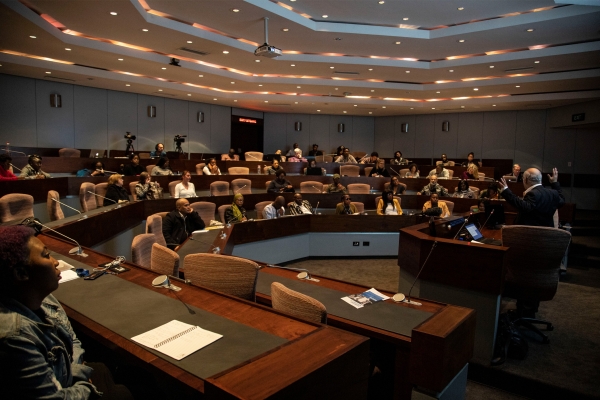Locating and dislodging race as a construct: An ongoing project
In a recent workshop and seminar, HSRC CEO Crain Soudien challenged social scientists to explore why racism has such traction; why the idea of race, despite its scientific invalidation, remains so ingrained and psychologically appealing. Charting the history of race, and of counter-narratives that emerged in South Africa in the 1930s, Soudien made a plea to acknowledge the very real impacts of racism, while breaking the construct that perpetuates it. By Andrea Teagle
“One of the more important tasks of our time is to dissect this myth [of racial-biology].” These words were spoken more than half a century ago, in a 1953 speech by the South African political thinker and anti-racial activist, Ben Kies. In that same speech, delivered to the cultural debating society, the New Era Fellowship (NEF), Kies went on to expose the myth that civilisation is solely a product of European culture, laying bare the essence of race as a means of control.
Kies had co-founded the NEF almost twenty years previously, in 1937. The fellowship was a safe space in the heart of District Six, an inner-city residential area in Cape Town, which was demolished in the 1970s after the apartheid government forcibly removed 60 000 residents, most of whom were classified as ‘coloured’. It was a place where young thinkers on the margins of the University of Cape Town could speak freely, and where accepted norms and beliefs could be held up to the light and critically dissected. Over the course of the NEF’s lifetime, what began as an inquisition into the identity of people classified as coloured became a theoretical and lived rejection of race as a concept.
Members of the NEF took their ideas of race as a construct to schools, to counter the prevailing racial ideology that was gripping South Africa ever tighter. “What made these leaders… stand out was their ability to project and make sense of their own local sociological positioning against the global system of imperialism,” writes HSRC CEO Crain Soudien in his recently published book, Cape Radicals: Intellectual and political thought of the New Era Fellowship, 1930s–1960s.
Addressing a collection of doctoral students at a workshop at the Nelson Mandela University in Port Elizabeth, Soudien said, “They deliberately decided to rewrite SA history… What they were trying to do was to show how this whole thing of empire worked. How empire, through education, through the missionaries, was about keeping people in states of subordination … that only got picked up in formal history and sociology in South Africa 30 or 40 years later.”
Science undermines race idea
Today, scientific consensus, on the back of the gene-mapping revolution, undermines the idea of essential racial differences. Scientists have argued that the social category of race is a poor proxy for genetic diversity, and its use should be phased out in biological sciences. As Soudien pointed out, referencing a 1997 statement by the American Anthropological Association, about 94% of genetic diversity occurs within so-called racial groups. Indeed, the African continent contains more genetic diversity than the rest of the world combined.
This was poetically demonstrated by the comparison of the full genomes of James Watson – famous for co-discovering the structure of DNA, and notorious for racist remarks – with two other scientists: fellow American of European ancestry Craig Venter, and Korean Seong-Jin Kim. As US science magazine Scientific American reported in February 2016, it transpired that Watson and Venter shared more genetic variations with Kim than they did with each other.
Yet, race remains deeply embedded in our everyday realities and understanding of the world; it is so pervasive that it takes the form of what Soudien calls ‘naturalised logic’. “To this day, we operate with this belief that I can look at you and work you out… simply on the basis of what you look like,” Soudien said. “You can’t go anywhere in the world and escape that.”
A means of control
The ‘stickiness’ of race is related to its usefulness as a means of control, Soudien suggested. Tellingly, race has meant different things in different parts of the world at different times, he said. “Race is whatever the politics in a particular space wants it to be… Whatever is convenient to maintain dominance.” In the early 17th century, plantation owners in North America required a controllable and subordinate workforce. From this need arose racial hierarchies in order to justify the enslavement of workers from Africa. “It’s a discourse that comes after the fact,” Soudien said.
In South Africa, hard racial categorisations came into use only in the late 1800s, replacing more variable social classification: colour, ethnicity, culture. Even at this time, forerunners to the Cape Radicals, such as author Olive Schreiner, were questioning the validity of this kind of categorisation. In 1929, University of Cape Town biologist Lancelot Hogben, picked up on this thread, rejecting the then widely accepted ideas of eugenics as bad science, and providing critical theoretical fodder for Kies, the influential political activist Isaac Bangani (IB) Tabata and the other founders of the fellowship. But the tide of racial ideology continued to gain momentum, reaching fever pitch in the 1930s.
Even as scientists in other parts of the world began to distance themselves from racial ideology in the aftermath of the Holocaust, some South African ‘white’ intellectuals, invested as they were in questions of place and identity, were deepening the ideas of race. The countering impact and legacy of the teachings of the NEF thinkers, and their forerunners is not easily measured, but evoke for us a critical counterfactual episode in South African history. Today, there is a need to continue the work they started to do in reimagining what it means to be human outside of these drawn lines: to consciously and continuously break down the use of racial categories, even as we recognise the impacts of racism, Soudien said.
Author: Andrea Teagle
Speaker: Professor Crain Soudien

